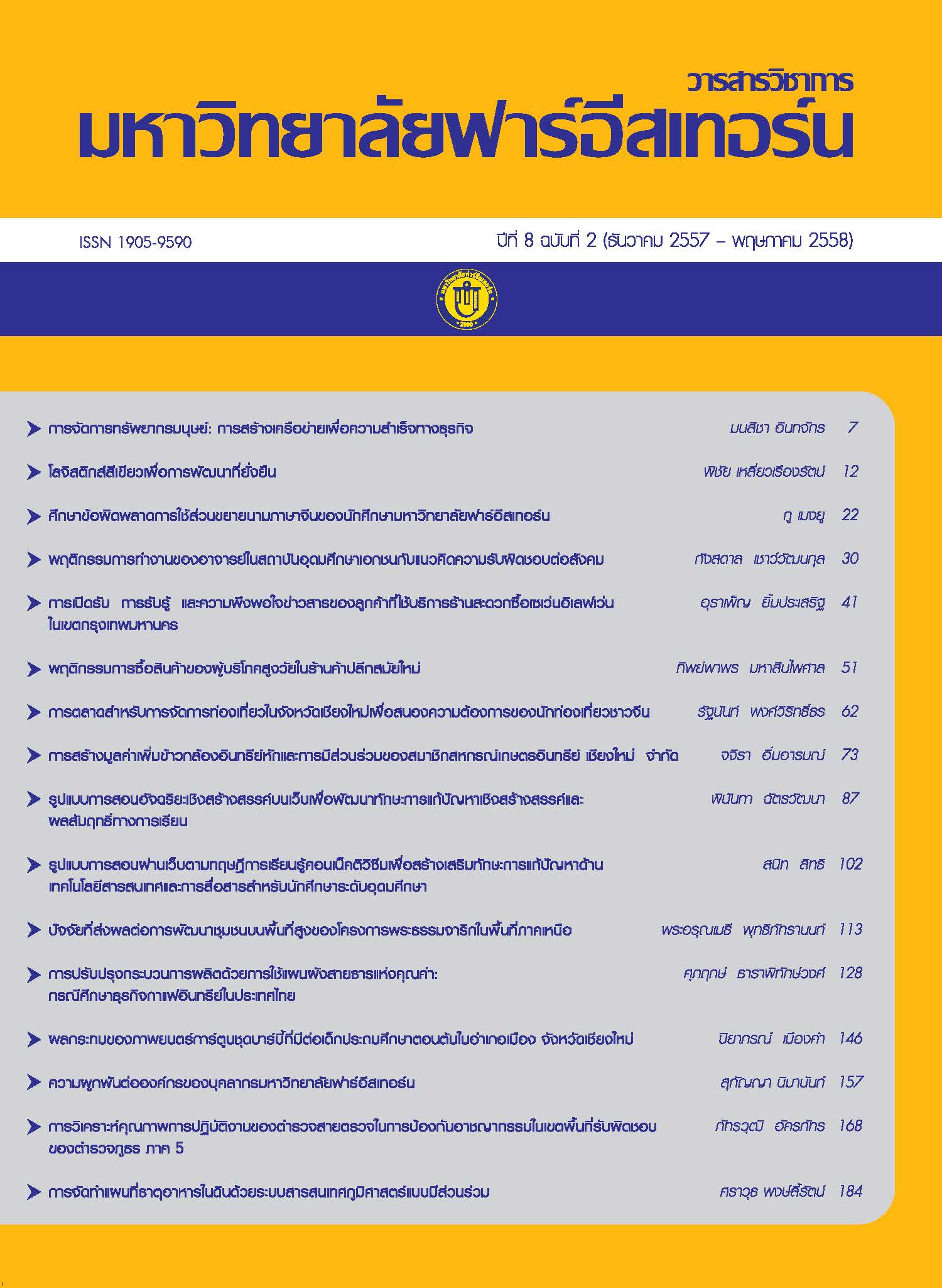โลจิสติกส์สีเขียวเพื่อการพัฒนาที่ยั่งยืน
Main Article Content
Abstract
การเกิดภาวะโลกร้อนและการเสื่อมสภาพของสิ่งแวดล้อมในปัจจุบัน เป็นประเด็นสำคัญที่ทั่วโลกให้ความสนใจ อันเนื่องมาจากก่อให้เกิดผลกระทบต่อสิ่งแวดล้อม เช่น มลภาวะในอากาศที่เกิดจากการขนส่ง การใช้พลังงานในกระบวนการผลิต และการใช้วัสดุด้านบรรจุภัณฑ์ การบริหารงานด้านโลจิสติกส์ เป็นกระบวนการเพิ่มประสิทธิภาพการบริหารจัดการการนำส่งสินค้าจากผู้ผลิตถึงผู้บริโภค และช่วยเพิ่มขีดความสามารถให้แก่ภาคธุรกิจและอุตสาหกรรมทั้งในแง่การลดต้นทุนการผลิต การสร้างมูลค่าเพิ่ม การประหยัดพลังงาน และการรักษาสิ่งแวดล้อมไปพร้อมกันด้วย อย่างไรก็ตามการบริหารด้านโลจิสติกส์ส่วนใหญ่มุ่งเน้นเฉพาะการลดต้นทุนด้านโลจิสติกส์เพื่อเพิ่มขีดความสามารถทางการแข่งขัน ไม่ได้คำนึงถึงสิ่งแวดล้อม แต่ในความเป็นจริงการลดต้นทุนด้านโลจิสติกส์สามารถนำไปสู่การ
ลดผลกระทบต่อสิ่งแวดล้อม โลจิสติกส์สีเขียวเป็นกิจกรรมหรือกระบวนการเคลื่อนย้ายสินค้า และข้อมูลสารสนเทศตั้งแต่ต้นน้ำไปยังปลายน้ำและย้อนกลับจากลูกค้าสู่จุดเริ่มต้น โดยลดการใช้พลังงานและทรัพยากรธรรมชาติ การปล่อยมลพิษน้อยที่สุด และได้เริ่มมีบทบาทต่อกระบวนการผลิต การค้าขาย การขนส่ง และการส่งมอบสินค้าโดยยังคงไว้ซึ่งประสิทธิภาพและประสิทธิผลโดยรวม ด้วยเหตุนี้โลจิสติกส์สีเขียวจึงถูกนำมาประยุกต์ใช้เพื่อสร้างภาพลักษณ์ขององค์กรมากยิ่งขึ้น อย่างไรก็ดีแม้เป็นกระแสที่ทั่วโลกให้ความสนใจ ทว่าประเทศไทยยังตื่นตัวน้อยมากหากเทียบกับต่างประเทศ และแนวทางสำคัญในการมุ่งสู่โลจิสติกส์สีเขียวให้ประสบความสำเร็จ คือ ต้องผนึกกำลังกันทั้งภาครัฐ และเอกชน ภาครัฐมีบทบาทสำคัญในการออกมาตรการรองรับ พร้อมสนับสนุนความพร้อมด้านโครงสร้างพื้นฐาน ขณะที่เอกชนต้องสร้างจิตสำนึก เพื่อให้เกิดกิจกรรมโลจิสติกส์สีเขียวที่ครบวงจรอย่างแท้จริง
Environmental deterioration and global warming have prompted ever-increasing public concern over sustainability and environmental impact such as air pollution from transport, energy usage in production process and packaging material handling. Logistics management, which delivers products from manufacturers to customers, is efficiency-added process. Moreover, it can increase business and industry competence in area of production cost reduction, value-added creation, energy conservation and together with environmental protection. However, logistics management concept focuses only logistics cost reduction for increasing competitive advantage but not regarding to environment. In fact, logistics cost reduction can lead to decrease the environmental impact by using green logistics. Green logistics describes all attempts to measure and minimize the ecological impact of logistics activities. This includes all activities of the forward and reverse flows of products, information and services between the point of origin and the point of consumption. It also seeks to reduce negative impact by redesigning sourcing, distribution systems and managing reverse logistics as to eliminate any inefficiency, unnecessary freight movements and dumping waste including packaging waste. Consequently, green logistics is mentioned to present a good gesture organization. In spite of this interesting topic, Thailand is unaware for it comparing to foreign countries. The important method to reach the successful green logistics is to collaborate between government and private sectors. Government sector has a significant role to launch supporting regulation, to get ready on infrastructures while the others must establish conscience for operated activities to complete green logistics cycle.
Article Details
1. Any views and comments in the Journal of Social Innovation and Lifelong Learning are the authors’ views. The editorial staff have not to agree with those views and it is not considered as the editorial’s responsibility.
2. The responsibility of content and draft check of each article belongs to each author. In case, there is any lawsuit about copyright infringement. It is considered as the authors’ sole responsibility.
3. The article copyright belonging to the authors and The Far Eastern University are copyrighted legally. Republication must be received direct permission from the authors and The Far Eastern University in written form.

